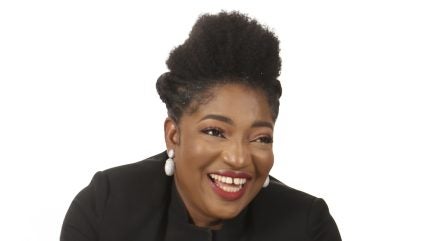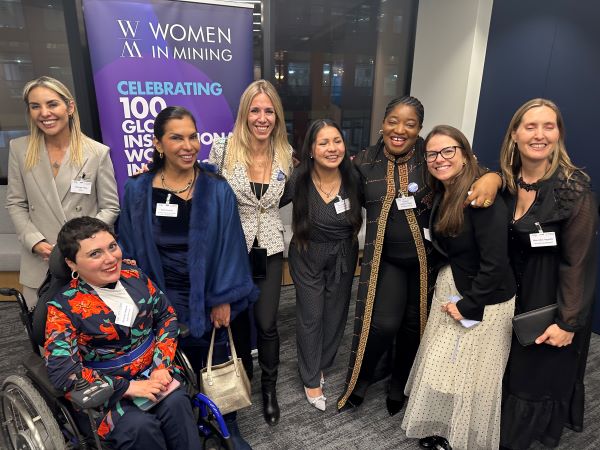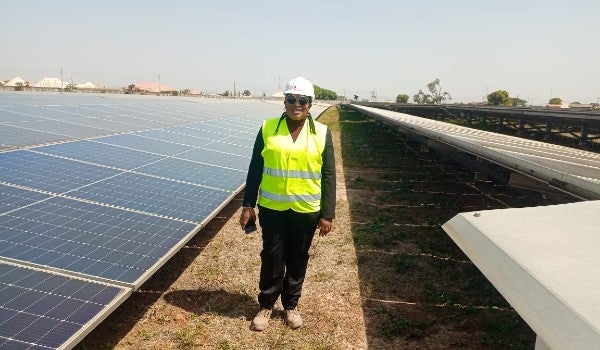
“If they don’t give you a seat at the table, you make your own seat, or you make your own table and seat. By all means, you must be a change maker.” That is how Comfort Asokoro-Ogaji defines her path, and her purpose.
A trained chemist and environmental specialist turned fierce advocate for women’s rights in Africa’s mining sector, Asokoro-Ogaji has spent the past 20 years building that seat and table from scratch.

Discover B2B Marketing That Performs
Combine business intelligence and editorial excellence to reach engaged professionals across 36 leading media platforms.
From founding her own consultancy when no jobs were available, to creating Women in Mining – Africa (WIM – Africa), which now operates in more than 24 countries, Asokoro-Ogaji has become a powerful voice for inclusion, justice and economic empowerment in an industry long dominated by men.
Her work fuses environmental sustainability with social justice, driving a continent-wide movement to ensure that African women are not just present in mining but leading it.
Last year, she was named one of WIM International’s 100 Global Inspirational Women in Mining 2024, a biennial list recognising women leading change in the industry.
Mining Technology spoke with Asokoro-Ogaji about her journey from entrepreneur to activist, her work empowering women in mining and how she is driving systemic change across Africa’s extractive industries.

US Tariffs are shifting - will you react or anticipate?
Don’t let policy changes catch you off guard. Stay proactive with real-time data and expert analysis.
By GlobalDataTwo decades of entrepreneurship and advocacy
Asokoro-Ogaji’s journey began in 2005, shortly after she earned a degree in chemistry, which would be followed a few years later by a Master’s and a PhD in Environmental Resource Management. Initially offering environmental compliance services to mining companies, she quickly noticed a pattern: communities, especially women, were doing the heavy lifting but receiving almost nothing in return.
“I saw women doing a lot of work for very little,” she recalls. “It became clear that these communities were not benefitting from their natural resources. There was a serious social injustice.”
Driven by a desire to bridge the gap between mineral wealth and community development, Asokoro-Ogaji launched her own consultancy in 2006. With no job prospects at the time, she turned to entrepreneurship, building a network of companies focused on sustainability and environmental services for capital investment projects across Africa.
Today, her ventures operate under the Richflood brand, with entities in Nigeria, the US and the UK. The group drives investment and strategic partnerships across key sectors including mining, energy, transport, construction and agriculture.
Richflood’s portfolio also includes Richflood Laboratories, specialising in mineral and environmental testing; the Richflood Learning Centre, which delivers industry-specific training; and Richflood Analytical Instruments, providing advanced tools and technology. Over the years, the group has established partnerships with global institutions such as the World Bank and the International Finance Corporation.
Beyond entrepreneurship, Asokoro-Ogaji is deeply committed to social impact. Through the Richflood International Foundation, she backs initiatives that promote sustainable development and empower communities across Africa.
It was in 2008 that her work took a decisive turn toward advocacy. After observing similar injustices in Liberia and other countries, she began mobilising female miners and engaging with host communities across Africa. By 2014, her informal grassroots efforts had coalesced into what would eventually become WIM-Africa.
Initially, Asokoro-Ogaji ran WIM-Africa alongside her business. “At the time, I didn’t have the financial base to fully commit,” she says. That changed in 2022, when she went all in. “We rebranded and began formalising our work with national governments and regional bodies.”
Today, WIM-Africa has a formal presence in 24 countries ─ including 22 in Africa, the US and the UK ─ and reaches more than 250 mining communities. Its 375 official members and 932 volunteers are organised under three core pillars: coalition and capacity building; advocacy; and implementing partnerships.

in Mining. Credit: WIM-Africa.
WIM-Africa: building a network for change
One of Asokoro-Ogaji’s proudest achievements is the coalition she has built across the continent. “We are constantly networking across different cultural backgrounds,” she says. “It is a huge achievement, leading such advocacy in Africa.”
WIM-Africa’s work includes formalising artisanal miners, securing land rights for women and improving education access for children in mining communities. A stark example of the realities she confronts came in the shape of a young girl named Comfort, like her, who lost an arm in a mining accident a few years ago, while loading feldspar for just $2 a day.
“She survived, but her hand was amputated. That story moved me deeply,” Asokoro-Ogaji says. WIM-Africa provided a scholarship for her education and helped her explore future studies in mining or chemical engineering.
Inspiring women in mining: Louise Porteus of Thor Explorations
This single case catalysed broader partnerships. WIM-Africa is now in dialogue with 151 universities including the Copperbelt University in Zambia and the School of Oriental and African Studies (SOAS), part of the University of London, to support its Next Gen Women in Mining initiative. The goal: to prepare young women for a broad range of careers across the mining value chain.
“It is not just about mining engineering,” Asokoro-Ogaji explains. “The future of critical minerals in Africa must include women.
“The mining ecosystem must be inclusive: women need space to thrive as leaders. Within five years, we aim to see more women driving sustainable development, shaped by better access to education and deeper involvement in the sector. That participation will also help shape the policies that guide us.”
Tackling structural inequality
WIM-Africa engages with 157 implementing partners, organisations tackling issues like education, child labour and gender-based violence (GBV). In Namibia, Asokoro-Ogaji partnered with White Ribbon, a male-led group fighting GBV, to bring gender-focused advocacy into mining communities.
Asokoro-Ogaji is blunt about the realities many face: “In Africa, everybody is an entrepreneur,” she says. “These women are doing the work. We must formalise them so they can start earning properly.”
To that end, Asokoro-Ogaji is particularly excited about a new collaboration with the African Export–Import Bank (Afreximbank). Through this initiative, women miners will be connected to a trade portal, allowing them to access fair prices, export markets and training in value addition techniques like small-scale mineral refining.
“It is about moving from earning peanuts to earning real money. That is when development truly starts.”
Data for policy, policy for change
Recognising the lack of reliable data on women and children in mining, WIM-Africa recently launched a continent-wide data-gathering initiative using mobile tools and geotagged imagery. While much of the current data relies on secondary sources, the aim is clear: generate original research to drive smarter policy and stronger advocacy.
“Readiness is important to me,” Asokoro-Ogaji says. “If we are not ready, we will keep lamenting while others take the opportunity.”
Driven by her “strategic empathy”, Asokoro-Ogaji balances this ambitious agenda while overseeing her business ventures. Her company, Richflood, remains active and well-structured – and Asokoro-Ogaji is now leading the launch of a lithium flotation processing company through a public-private partnership.
It is fitting for someone who describes studying and learning as her favourite pastime. “It makes me happy.”

Eliminating child labour
Asokoro-Ogaji speaks with unflinching honesty about the challenges of eliminating child labour from mining. “This is Africa. I followed my father to the farm growing up. No one questioned that. So, we strike a deal: the child must go to school. After that, if they must help, then so be it.”
WIM-Africa works with local leaders, schools and non-governmental organisations to formalise these agreements and ensure lasting impact.
From launching a consultancy in Nigeria to leading a continent-wide movement, Comfort Asokoro-Ogaji’s story is one of grit and purpose. Having lifted herself out of poverty, she has made it her mission to help others do the same: empowering women and youth with practical tools to break the cycle.
Her childhood dream of diplomacy has evolved into a mission to transform Africa’s mining sector into a platform for real empowerment.
“That is my dream now: transforming Africa through mining. That is why I never get tired.”





